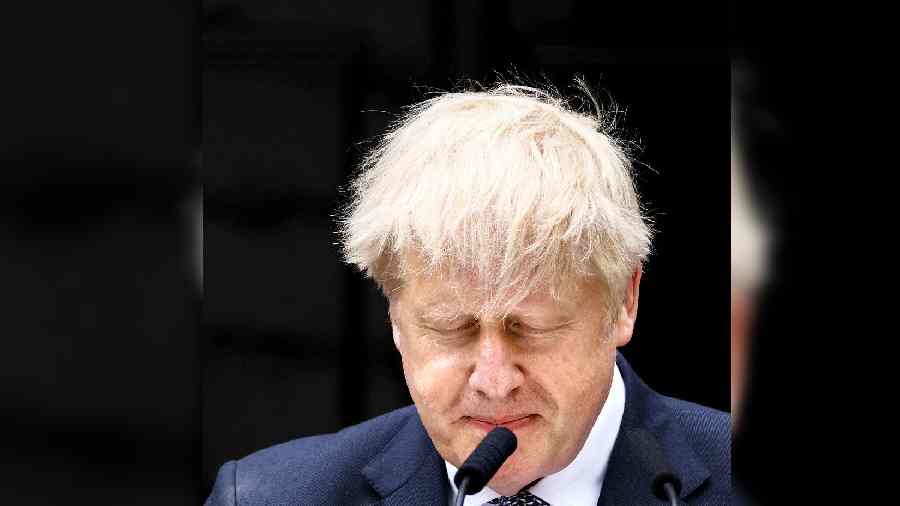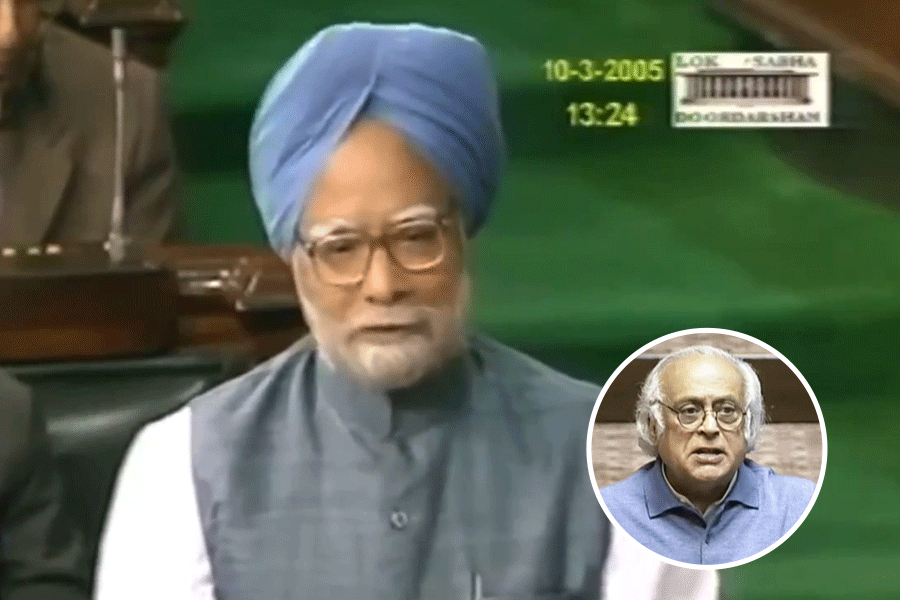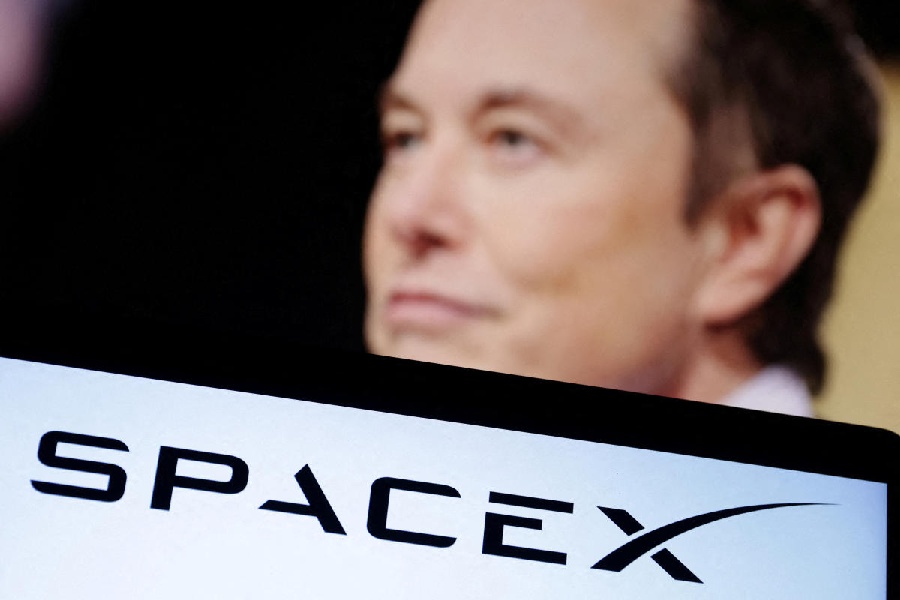Listening to what might yet be only the last act of one scene in the drama of Boris Johnson’s political career, I was struck by his admission that “no one is remotely indispensable”. The same words might yet emerge from the lips of the politician who told us he was a “fakir aadmi” who would pick up his jhola and walk away. But this being a land of courtiers and sycophants, I can also hear the cacophony of loyalist voices drowning anyone who wonders whether the jhola would suffice to tie up those splendid Jawahar coats and array of magnificent turbans. Or Air India One with its missile defence system.
Of course Johnson would not have been able to play to the gallery if Britain, too, did not boast time servers and operators. That apart, the present crisis reflects a polarisation the like of which England has not known since Whig and Tory ladies wore patches on different sides of the face to proclaim political affiliation. Echoes of that fierce battle reverberated in my email box nearly 6,000 miles away. “While I think it perfectly sensible, now Boris has resigned as Conservative leader, to allow him to stay on pro tem as prime minister for the sake of the bigger picture, i.e. the Russian war and our cost of living crisis, I fear the plotters aren’t going to permit it… ” lamented an ageing working-class man with no money and less ambition in the North of England for whose integrity I have the highest respect.
A contradictory mail boomed its way into my box within minutes. “Don’t bank on Johnson leaving gracefully” warned an elegant, highly-educated, left-leaning London hostess. “I think he will soon be claiming squatters rights in No.10.” I had asked her whether we would witness an ethnic Indian trying to oust someone whom the Ankara newspapers call an “Ottoman grandson”. “What a lovely idea!” she warbled before adding her devastating clincher.
It puts me in mind of an exchange of letters among Jawaharlal Nehru, Vallabhbhai Patel and Rajendra Prasad over the choice of India’s first president. All three were ostentatious fakirs; all three found it necessary for political credibility if not survival to put up an elaborate pretence of austerity, Nehru even claiming to live on only fifty rupees a month. Simplicity was the most deadly weapon in the armoury of these stalwarts whose protestations bestowed a wider meaning on Ronald Reagan’s alleged retort when asked if an actor could be president, ‘Show me a president who wasn’t!’ Why only presidents; the tag could apply to myriads of ministers (prime and chief) down to the humblest Rajya Sabha nominee.
As prima donnas, Nehru, Patel and Prasad knew what they were about. If I remember aright — and quoting from memory — Nehru who didn’t want Prasad as president had managed to rope in Patel on his side in favour of Chakravarti Rajagopalachari. Armed with some purported evidence of Patel’s thinking, Nehru suggested obliquely to Prasad that he might stand aside for Rajaji. Of course, the proposal was couched in the most flattering terms, citing Patel, praising Rajendrababu and his record of service, and saying how much more he could do for the country outside Rashtrapati Bhavan. The latter’s response was matchless. He had never aspired to any position, he declared, he had always only served the country, and been content to do that and nothing else. The presidential nomination had been forced on him; it was the last thing he wanted. What came through powerfully was a steely determination not to be done out of the job on which he had set his heart.
I hear those notes of feigned regret every time a creative artist laments being coerced to join a gentleman’s club, a buoyant corner-cutting businessman blames others for some designation — perhaps an honorary consulship — he is saddled with, or a politician deplores the boring statecraft that keeps him away from his true commitment to learning. Indira Gandhi famously declared after the Allahabad High Court judgment that she had done nothing wrong for she had done nothing for herself. The self and the non-self are sophisticated concepts that English education (which has created a civilisation of servants, according to Narendra Modi) cannot grasp. But hypocrisy goes back much farther in our culture.
As the young editor of a national newspaper’s Sunday magazine, I published an article by the jurist, G.D. Khosla, about episodes like churning and stealing the nectar of the oceans, misleadingly announcing the death of an elephant named after a famous warrior, and setting a eunuch ahead of an aggressive army, titled something like “A Little Evil for the Greater Good”. All hell broke loose. There was no organised sangh parivar in those days but Hindutva’s scattered seeds were already germinating. Rather than face demos and suffer gheraos, my editor persuaded Khosla, holidaying in Mussoorie (I think), to apologise. What struck me even then was that the protesters didn’t deny any of the instances of deceit that the article cited. Their only concern was the impression that such a narrative conveyed.
Not that pretence and posturing are unknown elsewhere. Or that highly-placed individuals readily give up the loaves and fishes of office. A photograph of Margaret Thatcher leaving Number 10 for the last time in 1990 clearly shows the tears in her eyes. No doubt Johnson draws comfort from the awareness that while Winston Churchill may loom over history as the ‘Great Commoner’ who spurned the title of ‘Duke of London’, he clung to the leadership of the Conservative Party for 10 years after the first calls for his resignation after the 1945 general election. Plunged into a deep depression when the electorate voted overwhelmingly for Clement Attlee’s Labour Party, Churchill showed no interest in actively leading the Opposition, leaving it to Anthony Eden, his heir apparent, and Rab Butler to actually run the Conservative Party. But after a serious confrontation with the 1922 parliamentary committee of Conservative backbenchers (which may again be called on to play a decisive role in deciding Johnson’s successor), he began to appear more frequently in Parliament even if Eden and Butler still handled most of the day-to-day work while Churchill built up his international reputation with dramatic speeches that floated novel ideas. He spoke of a “United States of Europe”, called for a European army, and in a sense launched the Cold War by notoriously warning in March 1946 that an “iron curtain” had descended on Europe.
It’s a moot point whether Churchill would ever have considered retirement, despite the atherosclerotic vascular disease — a progressive narrowing and hardening of the arteries supplying the brain with blood — from which he suffered, if it had not been for a severe stroke in June 1953 after giving a dinner in Downing Street for the visiting Italian president. The 78-year-old politician’s attitude hadn’t changed since 1946 when he said, “All my most intimate friends recommend retirement and I will fight the lot till the bitter end and challenge them to sack me.”
Those might have been Nehru’s words after the stroke in Bhubaneswar but for the candour which is utterly unIndian. But of both Churchill and Nehru it can be said that despite all vanities, they gave generously of their greatness to the motherland which was all the greater for that gift. Perhaps Japan’s cruelly murdered Shinzo Abe can join their ranks. But Johnson is not in that league. For the best that can be said of him, I must return again to Reagan who compared politics to show business. “You have a hell of an opening, you coast for a while, you have a hell of a closing.” No bit player can expect more. His successor has a more arduous task for he must shape the future… if post-Brexit Britain has one.










